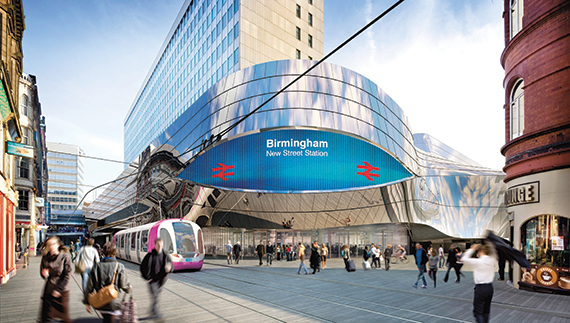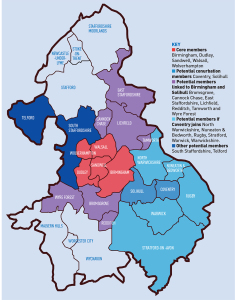 It is all a bit embarrassing for the West Midlands. Its commercial rival, Greater Manchester, forms the heart of a conurbation that has established a combined authority and struck a deal with government ministers for devolved transport and economic development powers.
It is all a bit embarrassing for the West Midlands. Its commercial rival, Greater Manchester, forms the heart of a conurbation that has established a combined authority and struck a deal with government ministers for devolved transport and economic development powers.
Meanwhile, councils in the West Midlands cannot even agree who should join any similar body.
Some of the reasons involve local rivalries, although there are also genuine questions about economic geography.
This all matters because combined authorities are the government’s method for devolving powers and money – mainly for transport and economic development.
The idea is that councils can better guide their area’s development without endlessly waiting for permission from Whitehall for local projects (see box).
Combined authorities pool resources and powers, without the costly and disruptive process of redrawing council boundaries.
Greater Manchester’s 10 boroughs have long collaborated and have a devolved transport budget, powers over franchised bus services, statutory spatial planning and control of business support budgets and further education.
The West Midlands would like something similar – but where would its boundary be? (see map, below).
Birmingham and the Black Country have the size and coherence to form a combined authority, but what of Solihull and Coventry? Both are part of the conurbation, but are wary of joining – for political reasons in Solihull, and because of strong economic links in the opposite direction between Warwickshire and Coventry.
Should rural Warwickshire therefore join? What about districts around Birmingham? What about Telford?
Local sensibilities can be complex. For example, Wolverhampton has promoted the 2.5m sq ft i54 business park with South Staffordshire district council, but the latter declines to join a combined authority.
These arcane disputes may exasperate developers keen on speed and certainty, but the West Midlands “super council” depends on their resolution.
The regional property industry wants progress. CBRE senior director Gary Cardin says: “A combined authority would be a very positive step.
“Greater Birmingham needs to think land use through around travel-to-work geographies. It’s something too big for individual localities to deal with.
“There is no plan at present for distribution of employment land and warehousing, and a lot of the best land is scattered, which is not the best way to create commercial focus.”
David Smeeton, head of Colliers International (Birmingham), agrees: “Greater Manchester got its story straight as a joined-up entity, but the economy is much bigger and we need to join up, too. The politicians are having their heads banged together.”
He adds: “There’s a need to work out relationships with surrounding towns like Lichfield and Tamworth, and how they fit in with Birmingham as the main local driver of growth. I think Solihull will join, while Coventry arguably has a different economy, although it is part of the West Midlands.”
Some believe governance could be an issue. James Dair, director of public sector at Lambert Smith Hampton, says: “The key is leadership. Will this new body take decisions or will each leader have to go back to their cabinet to have everything agreed, which will just increase bureaucracy?”
The Coalition’s abolition of regional planning bodies has “left a vacuum in strategic planning across council boundaries”, according to Mike Jones, strategic planning director at Richborough Estates. He believes there is an urgent need for West Midlands councils to ensure that economic development, housing growth and transport are planned in a “co-ordinated way to benefit all the region”.
The big thing any combined authority can oversee is transport – both its infrastructure and the services that use it.
Perhaps, unexpectedly, the property industry is worried by buses, as well as roads and rail.
Like everywhere outside London, West Midlands’ bus operators can run routes and set fares as they choose, without services being integrated with each other or with rail.
Greater Manchester is planning a system like London’s, in which the combined authority will specify routes, fares, frequencies and inter-modal ticketing.
Smeeton says: “Transport is absolutely key. We are about to get the Midland Metro extension from Snow Hill to [Birmingham] New Street, but what we really need is something like London’s Oyster card. It is fantastic the way you can just hop on and off trains and buses.
“It matters to the property industry because it is how you get people to sites that have been developed.
“Unfortunately, some bus companies here do not see service co-ordination as in their interest.”
Meanwhile, Cardin would like a combined authority to “tackle the haphazard approach that has been taken to public transport, because bus operators will not run less profitable routes, even though these might be essential to enable a workforce to reach a newly developed site”.
He is also concerned about the Midland Metro, a pale shadow of Greater Manchester’s multi-line system, with just one service from Birmingham to Wolverhampton, via West Bromwich.
Funding has been secured for extensions to the planned HS2 station at Birmingham’s Curzon Street and Wolverhampton’s main station.
But Cardin says: “There should be more extensions to places in the Black Country and Bromsgrove so it serves the wider area and Solihull and Coventry.”
Birmingham city council chief executive Mark Rogers says a combined authority could tackle this.
“Co-operation over enhancing transport is key and a combined authority could use opportunities to improve connectivity,” he says.
“The metro could run to Merry Hill in Dudley, and east through to the airport and HS2 interchange station, connecting sites there and going through key sites in the Black Country.”
Rogers says: “The most important thing is the leverage a combined authority would have to support economic development, rather than trying to do that authority by authority.”
University of Birmingham urban affairs teaching fellow Patrick Willcocks believes a combined authority is essential. “Greater Manchester has built an entire system of metro lines and it is generating an income that can be reinvested,” he says. “There is absolutely a feeling we are being left behind by Greater Manchester. There needs to be thinking at a conurbation level.”
With other conurbations’ combined authorities either running or planned, can the West Midlands afford to be left behind?
Combined authorities
• Cover two or more local authorities.
• Any area may apply.
• They each agree a package of devolved powers and funding with the government, usually covering transport and economic development.
• They are not elected; each council is represented by its leader.
 The West Midlands super council – will 22 go in to one?
The West Midlands super council – will 22 go in to one?
The West Midlands Combined Authority potentially has 22 members.
Its heart is Birmingham and the four Black Country boroughs of Dudley, Sandwell, Walsall and Wolverhampton.
To confuse matters, the Black Country already has its own local enterprise partnership, while Birmingham is in an LEP with Solihull and the districts of Bromsgrove, Cannock Chase, East Staffordshire, Lichfield, Redditch, Tamworth and Wyre Forest.
Solihull’s Tory leader Bob Sleigh says: “Any combined authority proposal would need to add significant additional value for Solihull.” The town’s Conservative parliamentary candidate, Julian Knight, is running a Keep Solihull independent campaign, a stance likely to tie Sleigh’s hands until after the general election.
Birmingham council chief executive Mark Rogers says: “Districts that look to Birmingham and Solihull in the LEP have been invited to join the combined authority and the perception is that they will be members on some basis.”
Coventry belongs to yet another LEP, with Warwickshire and the districts North Warwickshire, Nuneaton & Bedworth, Rugby, Stratford and Warwick.
The city council has made supportive statements about joining, but is unlikely to decide until March, says Rogers.
Warwickshire county council chief executive Jim Graham says: “It’s confusing, even for those of us involved. There have been two meetings of the authorities in Warwickshire, plus Coventry, but they have not reached a decision on whether to join with Birmingham and the Black Country.
“It’s for Coventry to decide, and we will deal with the consequences.”
Urban Telford is cut off from the conurbation by rural district South Staffordshire and both have declined to join a West Midlands combined authority, a stance CBRE director Gary Cardin warns could leave Telford “a backwater location”.
A combined authority could be operational by early 2016 with at least Birmingham and the Black Country in membership.











